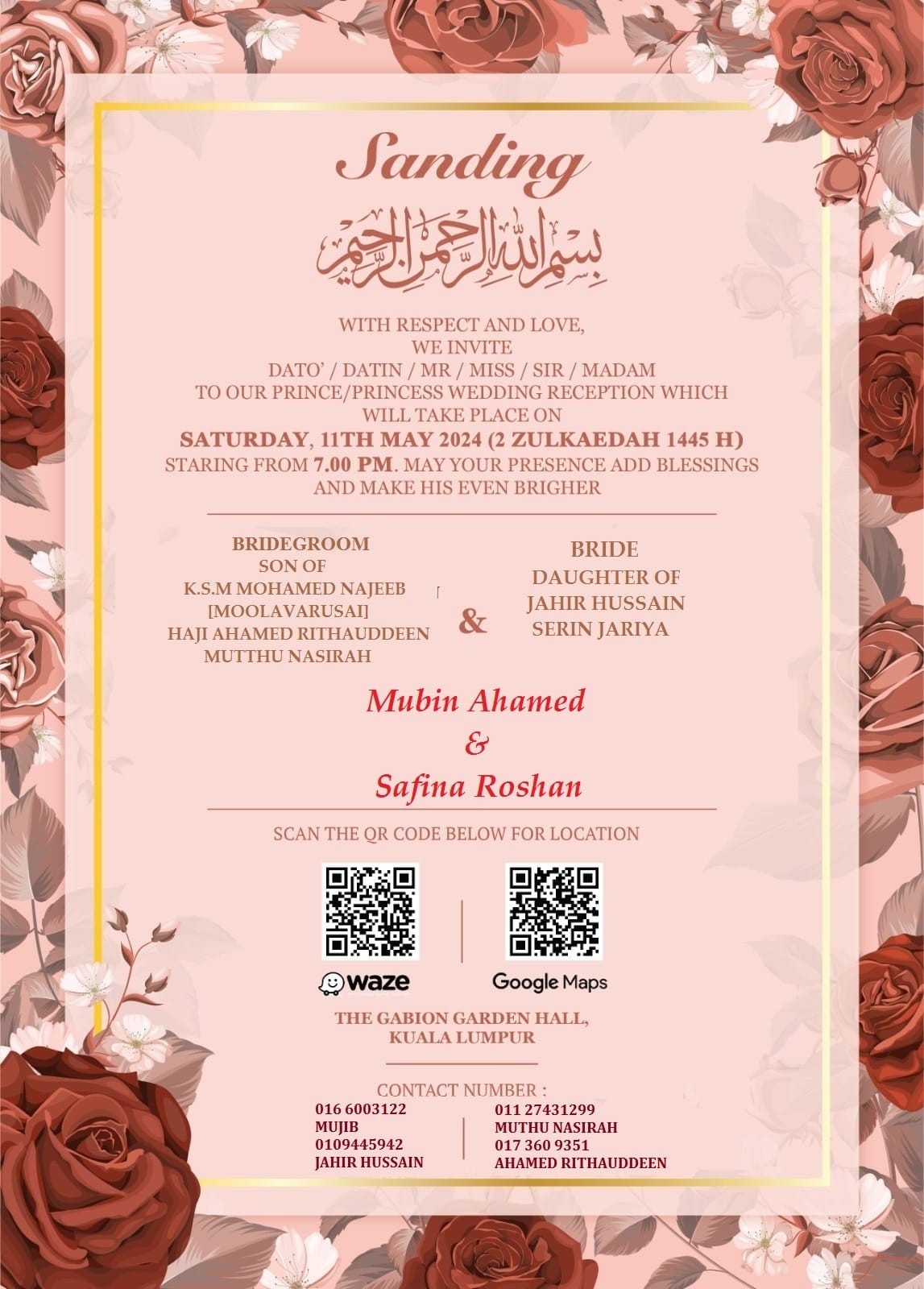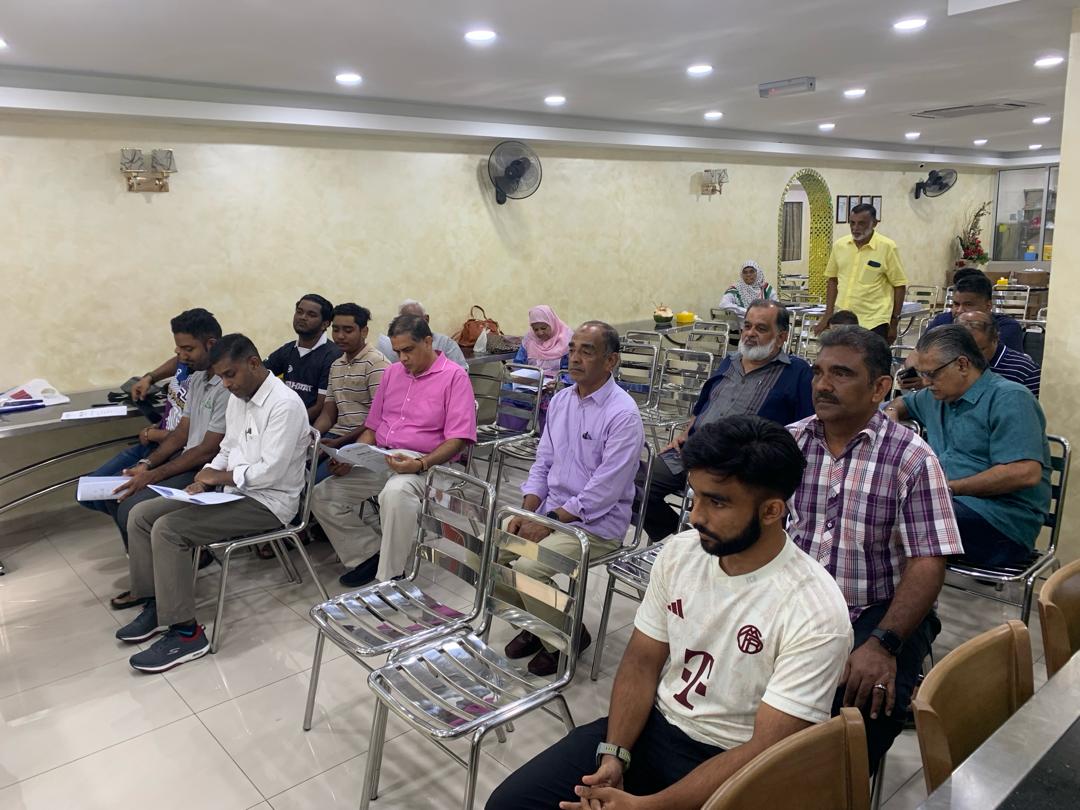THIS IS QURBAN (SACRIFICE)
- WEDDINGS & EVENTS
- THIS IS QURBAN (SACRIFICE)
THIS IS QURBAN (SACRIFICE)
Dear friends,
Very soon, Muslims all over the world would be celebrating ‘Eidul Adha’ – Day of Sacrifice, normally called as ‘Hari Raya Haji’ in Malaysia.
That is the celebration to symbolise ‘sacrifice’; and, we can see thousands & thousands of Muslims all over the world, offering ‘sacrifice’, in the form of slaughtering goats, cows & camels, to fulfill their duty of ‘offering sacrifice’.
But, do mere slaughtering of such animals signify ‘sacrifice’?
Allah SWT in Al-Quran clearly says:
“It is neither their meat nor their blood that reaches Allah, but it is piety from you that reaches Him. Thus We have made them subject to you that you may magnify Allah for His Guidance to you. And, give glad tidings (O Muhammad) to the doers of good.” (Surah Al-Haj 22:37)
This clearly says that just slaughtering of these animals in the name of ‘sacrifice’ would bring no good, unless it is done with piety. What is that piety? It is one’s total readiness to sacrifice everything that one has, in the
cause of Allah SWT.
Take the example of Nabi Ibrahim (a.s.). He got his first child – the son, Ismail (a.s.) – when he and his wife, Hajarah (a.s.) were quite old. So, anyone can imagine how precious that child would have been to them; and how most lovingly they would have brought up the child. When the child, Ismail (a.s.) was 13 years old, Allah SWT tested the strength of piety of Nabi Ibrahim (a.s.) by asking him to sacrifice his son – his only son, the most precious of all his belongings! Here again, we have to think about one aspect. Allah SWT tested Nabi Ibrahim (a.s.) of his devotion only when that precious child was 13 years old; not when the child was baby! If baby, the duration of love showered on that child would have been only a couple of years; or, a little more. But, when the child grew up to be a boy of 13, the intense love of the parents for the son would also have multiplied manifold. It is at this juncture that Nabi Ibrahim (a.s.) was instructed by Allah SWT to sacrifice his beloved son.
We simply cannot even imagine the intense sorrow that Hajarah (a.s.) – the mother of Ismail (a.s.) – would have experienced in giving away her only beloved son for sacrifice! However, when she was told that it was Allah’s command, she pulled up courage and made herself accept Allah’s command. Nabi Ibrahim (a.s.) was never perturbed; neither was the son, Nabi Ismail a.s. Knowing that it was Allah’s Will, most readily they accepted to fulfill Allah’s command. This is the fundamental concept of ‘qurban’ – sacrifice – to sacrifice that we love most, or treasure most, for the sake of Allah SWT. Unless this readiness to sacrifice – or give away – that which one treasures most, is not within one’s self, whatever one may give in the form of sacrifice (slaughtering cows, goats, camels) is of no benefit at all, in the ‘eyes’ of Allah SWT, as is said in Al-Quran (5:27):-
“And (O Muhammad) recite to them the story of the two sons of Adam, in truth, when each offered a sacrifice (to Allah), it was accepted from the one but not from the other. The latter said to the former (whose sacrifice was accepted): ‘I will surely kill you’. The former said: ‘Verily, Allah accepts only
from those who are Al-Muttaqun (pious)’”.
It is clear from the above verse, that not every sacrifice is accepted by Allah swt. Only the sacrifice, offered by those who are ever willing to give away that
which they love most, for the sake of Allah swt, is accepted.
It is said that, when an animal is slaughtered as sacrifice, before the first drop of blood falls to the ground, all the sins of that person offering the sacrifice are pardoned; and, he is ‘rewarded’ (pahala) amounting to the number hairs on the body of the animal. Yes! That is true – only for those who are pious; and ready to sacrifice that which they treasure most.
For example, a person has saved enough money to go for Haj. He has made all preparations to undertake the pilgrimage. At that time, a friend of his sees him and tells him that he needs about RM5000 very badly to settle his debt; otherwise, his house would be sealed, and his things confiscated. After verifying his story, and finding it to be true, if that person who had saved money to perform Haj, gives away that money to save his friend from his
peril, that is true sacrifice – qurban.
Let’s say a man has saved enough money to buy a goat for qurban, which may cost about RM700. Just 3 or 4 days before he intends to buy the goat, a poor man approaches him and says that he has no sight in both of his eyes, because of cataract. And therefore, he could not do any job to earn a living. He had been asked by the hospital authorities to pay up RM700 – the cost of lens – for the operation. This poor man could not pay that amount. So, he pleads with this man to give him that amount so that he could undergo operation, and gain vision at least in one eye – by which he could start earning. If this man could give away that amount which he had saved to buy a goat, then that is true ‘qurban’.
Let’s say a rich man intends to offer one or a few cows as qurban. But, he never pays any heed to the suffering of the poor in his own country; or, in countries like Somalia, Gaza; and turns his back from doing some other good deeds. However many cows or goats he may offer as qurban (sacrifice) it is NOT going to bring him any benefit of qurban – except eating the flesh by himself & others. Only if he sacrifices (qurban) part of his wealth in the cause of Allah SWT by helping the needy, then only his offerings of qurban would be accepted by Allah SWT; and will be rewarded with all the benefits of qurban; such as:
- the ablution of one’s sins, even before the first drop of blood of the animal sacrifice, touches the ground;
- the benefits (pahala) equivalent to the number of hairs on the body of the animal sacrificed would be fully bestowed on him by Allah SWT.
So, ‘qurban’ (sacrifice) is NOT mere slaughtering of animals (goat, cow, camel) but it is truly the sincere sacrifice of one’s treasured belongings to the needy, to allay their sufferings, of which Allah SWT is always most pleased, as He says in Al-Quran (3:92):-
“By no means shall you attain Al-Birr (Allah’s Reward, i.e. Paradise), unless you spend (in Allah’s Cause) of that which you love; and whatever of good
you spend, Allah knows it well.”
There are a few instances in which a person, who had saved money in a hard way to perform his obligation of Haj, gave away that amount that he had saved for Haj, for some other very important urgent cause – forfeiting his chance to fulfill his obligation of Haj. However, he was informed – sometimes in his dream, or by some ‘vision’ – that his haj had been accepted, although he had not even set out to perform haj! The benefit of Haj has been showered upon him by Allah SWT because of his sacrifice – true to the Quranic verse:
“…………… And, give glad tidings (O Muhammad) to the doers of good.”
(22:37).
THIS IS QURBAN (SACRIFICE).
Categories
Events
Blog Archieve
- [+] 2024 (2)
- [+] 2023 (2)
- [+] 2021 (2)
- [+] 2020 (8)
- [+] 2019 (5)
- [+] 2018 (5)
- [+] 2017 (4)
- [+] 2016 (16)
- [+] 2015 (42)
- [+] 2014 (36)
- [+] 2013 (15)
- [+] 2012 (19)
-
[+]
2011 (61)
- [+] January (7)
- [+] February (7)
- [+] March (4)
- [+] April (1)
- [+] May (5)
- [+] June (1)
- [+]
July
(8)
- Kem Ibadah Wanita Pra-Ramadhan
- Invitation to Majlis Berbuka Puasa MAMJ
- Majlis Berbuka Puasa MAMJ 2011
- Ramadhan 2011 Fund
- Another Achievement by Our Past President Haji Mohamed Ismail Sharif – He is Among the Top 50 Islamic Finance Lawyers Globally. Alhamdulillah
- பட்டமளிப்பு விழா
- Majlis Buka Puasa Amal 2011 – Anjuran Indiamuslim.org (IM.ORG) Dengan Usahasama Muslim Manaver Sanggam (MMS)
- Chess tournament
- [+]
August
(9)
- ALL RELIGIONS SAY ‘ONE’ – Part 2 (In Hinduism, Sikhism, Christianity, Judaism, Confucianism & Buddhism)
- ALL RELIGIONS SAY ‘ONE’ – Introduction
- PENYERTAAN PAS DALAM PERARAKAN BERSIH 2.0
- BAN ON RECITAL OF THE QURAN OVER LOUDSPEAKERS IN PENANG
- MY VIEW ON MARISA DEMORI’S LETTER IN NEW STRAITS TIMES
- THE ISSUE OF MURTAD (APOSTASY)
- ALAGAI PATTAMALIPPU VIZHA
- THANK YOU MAMJ MEMBERS
- RAMADHAN MUBARAKH!!!!!
- [+] September (5)
- [+] Octobar (4)
- [+] November (3)
- [+] December (7)
-
[+]
2010 (160)
- [+] January (8)
- [+] February (3)
- [+] March (1)
- [+] April (3)
- [+] June (1)
- [+]
July
(15)
- ஜோதிடம் , சகுனம் பார்த்தல் : இஸ்லாமியக் கண்ணோட்டம்
- OUR PRESIDENT AND DATIN VISIT DR.APJ ABDUL KALAM
- உம்மத்தின் வழிமுறை
- IBUBAPA
- The Key to Raising Righteous and Successful Children
- ங்கள், செலவழிக்கும் முன் சம்பாதியுங்கள்
- A New Domain Extension “.CO” Launched
- தாம்பத்திய உறவு
- கமலாதாஸ் – ஸுரையா :
- உறவுக்கு அப்பால் தாய் தந்தை
- PERIYAR DASAN’S SPEECH AT JEDDAH:PHOTOS
- பெண்ணுரிமையும்! இன்றைய பெண்களும்!!
- FAMILY VALUES : THE MOTHER
- Invitation to Program Rapat 1Malaysia
- Just See What British Thought of India and How They Managed to Rule Us
- [+]
August
(19)
- ALLAH THE GREATEST
- RAMADHAN : MONTH OF PATIENCE
- My Mother, My Best Friend
- RAMADHAN : MONTH OF PATIENCE
- Enriching the Community
- ZAKAT DISTRIBUTION
- 6-Story Jesus Statue Struck By Lightning!!!
- இல்லறமே நல்லறம்!!!
- வரதட்சணை : பூனைக்கு மணி கட்டுவது யார்?
- Dato’ Haji Thasleem and Datin Dr.Yazmeen with Dr. APJ Abdul Kalam
- அமைதியை இழந்து தவிக்கும் அமெரிக்க வீரர்கள்!
- WE ARE THE HONORABLE WOMEN OF ISLAM!
- Recent Archaeological find by Aramco During Gas Exploration in Saudi Arabia- Subhanallah
- ஒரு சகோதரியின் உலக சாதனை !
- BELOVED AMMA & ATTHA
- எதை கொடுப்பது ? எதை எடுப்பது?
- திருமணம் என்பது ஒவ்வொரு மனிதனில் வாழ்விலும் ஒரு முக்கியமான அம்சம்.
- முஸ்லிம்களுக்கு ஏன் இவ்வளவு பெருமை என்று வியந்தேன்…
- ஏன் இஸ்லாம் — ஆமினா அசில்மி
- [+]
September
(21)
- A Police Officer Wrote This! Please Read coz may Save your Life!
- Al-Quran
- APPEAL FOR LAND BY MAMJ
- History Mystery – Interesting and Incredible
- Makkah (SubahanAllah) -Current Development
- Prophet Muhammad SAW Praised by Non-Muslim Leaders and Philosophers
- Interactive Sites on Medical Information
- Indraiya Poluthu Iniya Poluthaaga Amaiyattum
- BABRI MASJID CASE -JUDGEMENT ON 24TH.SEPTEMBER 2010
- நபி மொழிகள் !!!
- The Minor Signs of the Last Day
- அல்லாஹ்விடம் உதவி தேடுங்கள்!
- Walking Helps Keep Body and Brain Young
- NY imam says mosque fight worth the controversy
- BELOVED ATTHA : YOU ARE THE BEST
- ஒரு குத்துச்சண்டை வீரரின் அழுகை!
- Ahmedabad’s Bus System a Hit with Several Countries
- Breaking News-RAMADHAN FUND 1431H
- All for a Palm Tree in Jannah
- MAMJ President at The Orphanage in Kg.Manjoi Ipoh
- MAMJ President at Buka Puasa Organised by Tanjung Muslim Association Penang in Association with Penang Hindu Sangam and Klinik Derma Sivasanta
- [+]
Octobar
(34)
- The Human Camera
- Outstanding Animations
- Best Signpost in India
- காய்கறிகள் பழங்கள் மூலமாக இருதய அடைப்பை நீக்க முடியுமா ?
- Better to be Lion Hearted!
- Peace of Mind Tips and Advice
- சில பொன்மொழிகள்..
- India’s Rare Pictures
- Home of a Mexican Drug Lord being raided!
- What is I C E ?
- Life iN the Year 3000
- GEMS OF WISDOM
- Regular Health Mistakes
- மகிழ்ச்சியாக இருப்பதற்குக் காரணங்கள் தேவை இல்லை
- Existence of Allah
- TO ALL AMMA’S : IMPORTANCE OF BREASTFEEDING
- ஆரோக்கியமாக வாழ ..
- Brain Damaging Food and Habits
- The status of the family in Islam
- Allah looks to your Heart & Deeds
- Shine a Light and enjoy your Coffee
- Be Very Careful of Rat Urine/Droppings
- THE PAST IS GONE FOREVER!!!!
- Taxi in Dubai
- Coincidental! – Good for Your Health
- ALLAHU AKHBAR!!
- The First Medical Council in The World
- Inside Ka’bah & Airmata Rasulullah SAW
- A Muslim Student in India Fights for Her Right to Dress in Islamic Way
- The Best Person in The History of Mankind
- FABULOUS COMPILATION
- ETIQUETTE OF NAMING CHILDREN
- Islam Again in Ayodya
- Interview with British Journalist Yvonne Ridley
- [+]
November
(38)
- Suhas Gopinath from Bangaluru,WORLD’S YOUNGEST CEO
- IF YOU HAVE A WILL, YOU WILL!!!!
- DISIPLIN ANAK-ANAK!!
- BE READY!!!!!!!!!!!!!
- REMEMBER! REMEMBER! REMEMBER!
- 360 DEGREE PICTURE – THE COCKPIT OF THE AIRBUS A380
- Allah takes Your Soul When You sleep
- 16 Amazing Photos that captured the world
- Be Amazed By The Beauty Of Nature
- MAMJ Presidents Speech at Masjid Muslim India Ipoh
- A Story of Appreciation
- Mirror or 2-Way Glass? BE CAREFUL
- God’s Work
- English is a Funny Language
- Hari Raya Aidiladha Wishes
- Superb Sentences By Famous People
- Dont Be Serious, Be Sincere
- Eating Fruits The Proper Way
- MUSLIM MOROCCANS LIVEHOOD
- Tony Blair’s sister-in-law Lauren Booth converts to Islam
- Success dosen’t come within a day! – MAMJ n Alagai Makkal
- பெண்
- THE SMALLEST GIRL IN THE WORLD!!!!!
- கோபம் – வேண்டவே வேண்டாம் !!!
- FED UP OF LIFE?
- SOCIAL CLASSES IN ISLAM???
- The Charles Schulz Philosophy
- ஆசைகளை சீர்படுத்துங்கள்
- ஆசைகளை முறைப்படுத்துங்கள்
- CWG 2010 Special – PHOTOGRAPHY
- Sejda Miracle
- Wedding Dates -Avoid Clash of Dates
- New Drug in Schools? Parents Please Take Note
- DEATH SENTENCE FOR A KIDNAPPER IN YEMEN
- AMAZING TRAIN ROUTES
- RICH INDIA? POOR INDIA? DO YOU BELEIVE THIS?
- One Call (ESTAWOO = Arrange yourselves) and The Impossible Happens
- To All Parents!
- [+]
December
(17)
- 14 YEARS OLD MOHAMED SUHAIL’S ACHIEVEMENTS:
- CONGRATULATIONS TO ALL MAMJ STUDENTS WHO SUCCEEDED IN PMR
- Notification of Wedding Dates
- Benefits of Drumstick leaves ( Tamil – Murungai leaves )
- Small teaser for Alagai Makkal..Enjoy!
- Niagara Falls 99 years ago. Worth Looking At
- 4 THINGS YOU PROBABLY NEVER KNEW YOUR MOBILE PHONE COULD DO
- ALAGANKULAM BIRDS SANCTUARY
- The Goodthings of HONEY
- The Ugly Briton
- The Cucumber
- Naive, Dim-wit or Extreme?
- Worth reading!
- Unconditional Love
- Muharram Message
- Muharram Greetings
- Amazing Houses Around the World – General Knowledge for Alagai Makkal
-
[+]
2009 (20)
- [+] September (2)
- [+] Octobar (3)
- [+] November (4)
- [+]
December
(11)
- Islam and Science
- Speak more in Malay -Dr. M Tells Indian Muslim
- Annual tax filing for YA 2009 – are we ready
- Divorce?! Separated!? Why?
- Wearing hijab – Compulsion, option or willingness?
- MAMJ EXCO MEET THE MEMBERS AT SUNGAI PETANI
- DINNER AND GIFT PRESENTATION TO EXCO MEMBERS 2006 – 2009
- Newspaper Clippings from India
- Eid al-Adha and Hajj 2009
- Thoughts to Share
- 2009 MAMJ Imam Al-Ghazzali Merit Awardees
- [+] 1996 (1)
- [+] 1993 (1)
- [+] 1881 (1)
-
[+]
0 (1)
Advertisement
Newsletter Sign Up
For Latest Updates




